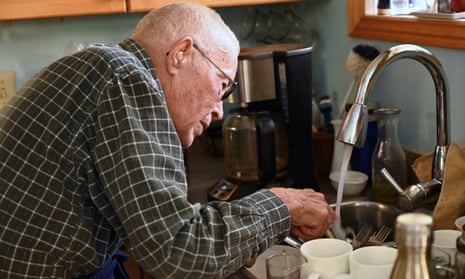Canada’s federal government has reached a C$8bn settlement in two class-action lawsuits with First Nations communities over access to clean drinking water.
The agreement promises to compensate residents, ensure drinking water infrastructure is built and modernize legislation – as First Nations leaders have been demanding for decades.
“Our commitment is to ensure that all First Nations communities have access to clean, safe and reliable drinking water,” said Marc Miller, Indigenous services minister, at a press conference late on Friday.
Canada is one of the most water-rich nations in the world, yet in 32 communities across the country, the government has issued 51 advisories against drinking water tainted by industrial contaminants, bacteria or parasites. The federal government has eliminated advisories in more than 70 communities, but it has fallen short of its promise to end advisories in all communities this year.
Earlier this year, the Guardian reported that Curve Lake First Nation, Neskantaga First Nation and Tataskweyak Cree Nation were suing the government for C$2.1bn (US$1.7bn) in damages – the costs associated with trucking bottled water for years and a water treatment system for the whole community.
The proposed settlement allocates C$1.5bn to an estimated 142,000 individuals from 258 First Nations.
Compensation is expected to be calculated based on how remote a person’s community is, how long they’ve been without clean water and if they have suffered health issues such as eczema or gastrointestinal illness from the poor water quality.
In Manitoba, the water advisory against Shoal Lake 40 has been in place since 1997. Neskantaga, in northern Ontario, has been under a drinking water advisory since 1995.
“Why does this have to happen? Why did we have to sue the government in order to get this thing to where it is today?” said Wayne Moonias, Neskantaga chief, during the press conference. “We have suffered so much, we have lost so much, we have endured so much. But yet our community continues to be resilient. We know how hard it is if you don’t have the basic necessities of life.”
With a federal election looming, New Democratic party leader Jagmeet Singh sharply criticized the governing Liberals for their failure to provide access to clean water.
“Indigenous people have had to fight in court for basic human rights, including for access to clean drinking water,” he tweeted after visiting Neskantaga last week. “It should never have come to this.”
Curve Lake First Nation, a community surrounded on three sides by a lake, has not had guaranteed access to clean drinking water for more than three decades.
“We have made a difference,” said chief Emily Whetung at the press conference, adding that the agreement came with “enforceable timelines”.
If Ottawa fails to hold up its commitments under the settlement agreement, First Nations would be able to use a new dispute mechanism.
The federal government has pledged to create a C$400m First Nation economic and cultural restoration fund. An additional $400m would be distributed annually to ensure communities can access clean drinking water, totalling nearly $6bn over the next ten years – funds that were previously announced by the government.
In February, a scathing report from Canada’s auditor general found that the federal government had failed to invest sufficient resources to end drinking water advisories and that much of the work was lagging even before the pandemic hit.
“I am very concerned and honestly disheartened that this longstanding issue is still not resolved,” Karen Hogan told reporters. “Access to safe drinking water is a basic human necessity. I don’t believe anyone would say that this is in any way an acceptable situation in Canada in 2021.”
The settlement is subject to court approval and some details still need to be negotiated.
